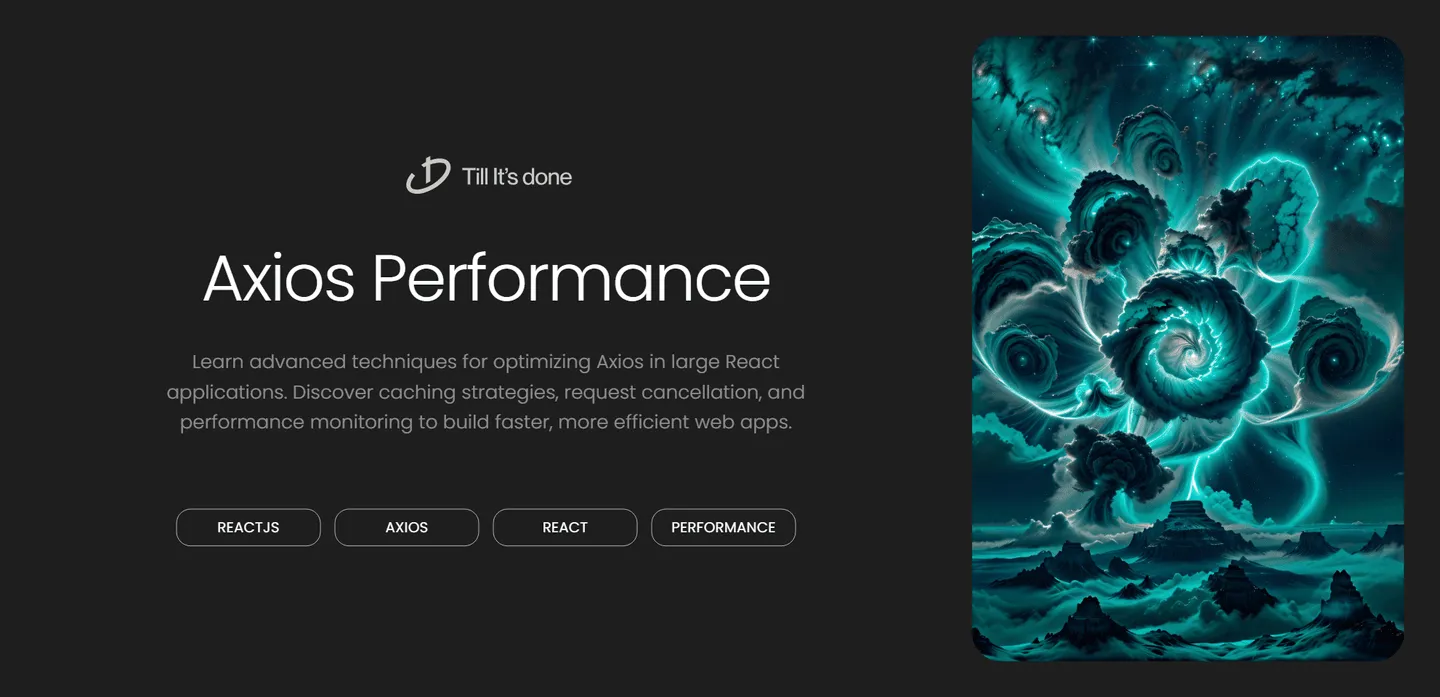- Services
- Case Studies
- Technologies
- NextJs development
- Flutter development
- NodeJs development
- ReactJs development
- About
- Contact
- Tools
- Blogs
- FAQ
Optimize Axios Performance in React Apps
Discover caching strategies, request cancellation, and performance monitoring to build faster, more efficient web apps.


Optimizing Performance with Axios in Large React Applications
In today’s world of complex web applications, efficient data handling can make or break your user experience. As React applications grow larger, managing API calls becomes increasingly crucial. Let’s dive into some advanced techniques for optimizing Axios in your React applications that go beyond the basics.
Understanding the Performance Bottlenecks
When building large-scale React applications, we often encounter scenarios where multiple components require the same data, leading to redundant API calls. This not only impacts performance but also increases server load and potentially costs.

Implementation Strategies
1. Request Interceptors and Caching
One of the most effective ways to optimize Axios performance is implementing a robust caching system. Here’s an advanced approach that significantly reduces unnecessary network requests:
const cache = new Map();
axios.interceptors.request.use(config => { const cachedResponse = cache.get(config.url); if (cachedResponse && Date.now() - cachedResponse.timestamp < 60000) { return Promise.reject({ useCache: true, data: cachedResponse.data }); } return config;});
axios.interceptors.response.use(response => { cache.set(response.config.url, { data: response.data, timestamp: Date.now() }); return response;});2. Request Cancellation and Rate Limiting
In single-page applications, managing concurrent requests and preventing race conditions is crucial:
function useAPIWithCancel() { const cancelTokenRef = useRef();
const makeRequest = async (url) => { if (cancelTokenRef.current) { cancelTokenRef.current.cancel('Operation cancelled due to new request'); }
cancelTokenRef.current = axios.CancelToken.source();
try { const response = await axios.get(url, { cancelToken: cancelTokenRef.current.token }); return response.data; } catch (error) { if (!axios.isCancel(error)) { throw error; } } };
return makeRequest;}
3. Response Transformation and Error Handling
Implementing a standardized response transformation layer can significantly improve code maintainability and performance:
const axiosInstance = axios.create({ baseURL: process.env.REACT_APP_API_URL, transformResponse: [...axios.defaults.transformResponse, data => { // Custom data transformation const transformed = someTransformationLogic(data); return transformed; }], transformError: (error) => { // Centralized error handling if (error.response?.status === 429) { return retryRequest(error.config); } throw error; }});Advanced Optimization Techniques
-
Request Deduplication: Implement a request queue system to prevent duplicate API calls for the same data within a specified time window.
-
Prefetching Strategy: Utilize route-based prefetching to load data before users navigate to specific sections of your application.
-
Selective Polling: Implement intelligent polling that adjusts its frequency based on user activity and data staleness.
Monitoring and Performance Metrics
To ensure your optimizations are effective, implement performance monitoring:
axios.interceptors.request.use(config => { config.metadata = { startTime: new Date() }; return config;}, error => { return Promise.reject(error);});
axios.interceptors.response.use(response => { const duration = new Date() - response.config.metadata.startTime; // Log or track the duration return response;}, error => { return Promise.reject(error);});Conclusion
Optimizing Axios in large React applications requires a multi-faceted approach. By implementing these strategies, you can significantly improve your application’s performance, reduce server load, and enhance the user experience.
Remember that optimization is an iterative process. Regularly monitor your application’s performance metrics and adjust your strategies based on real-world usage patterns.

 สร้างเว็บไซต์ 1 เว็บ ต้องใช้งบเท่าไหร่? เจาะลึกทุกองค์ประกอบ website development cost อยากสร้างเว็บไซต์แต่ไม่มั่นใจในเรื่องของงบประมาณ อ่านสรุปเจาะลึกตั้งแต่ดีไซน์, ฟังก์ชัน และการดูแล พร้อมตัวอย่างงบจริงจาก Till it’s done ที่แผนชัด งบไม่บานปลายแน่นอน
สร้างเว็บไซต์ 1 เว็บ ต้องใช้งบเท่าไหร่? เจาะลึกทุกองค์ประกอบ website development cost อยากสร้างเว็บไซต์แต่ไม่มั่นใจในเรื่องของงบประมาณ อ่านสรุปเจาะลึกตั้งแต่ดีไซน์, ฟังก์ชัน และการดูแล พร้อมตัวอย่างงบจริงจาก Till it’s done ที่แผนชัด งบไม่บานปลายแน่นอน  Next.js สอน 14 ขั้นตอนเบื้องต้น: สร้างโปรเจกต์แรกใน 30 นาที เริ่มต้นกับ Next.js ใน 14 ขั้นตอนเพียงแค่ 30 นาที พร้อม SSR/SSG และ API Routes ด้วยตัวอย่างโค้ดง่าย ๆ อ่านต่อเพื่อสร้างโปรเจ็กต์แรกได้ทันทีที่นี่
Next.js สอน 14 ขั้นตอนเบื้องต้น: สร้างโปรเจกต์แรกใน 30 นาที เริ่มต้นกับ Next.js ใน 14 ขั้นตอนเพียงแค่ 30 นาที พร้อม SSR/SSG และ API Routes ด้วยตัวอย่างโค้ดง่าย ๆ อ่านต่อเพื่อสร้างโปรเจ็กต์แรกได้ทันทีที่นี่  วิธีสมัคร Apple Developer Account เพื่อนำแอปขึ้น App Store ทีละขั้นตอน อยากปล่อยแอปบน App Store ระดับโลก มาอ่านคู่มือสมัคร Apple Developer Account พร้อมเคล็ดลับ TestFlight และวิธีอัปโหลดที่ง่ายในบทความเดียวนี้ได้เลย
วิธีสมัคร Apple Developer Account เพื่อนำแอปขึ้น App Store ทีละขั้นตอน อยากปล่อยแอปบน App Store ระดับโลก มาอ่านคู่มือสมัคร Apple Developer Account พร้อมเคล็ดลับ TestFlight และวิธีอัปโหลดที่ง่ายในบทความเดียวนี้ได้เลย  TypeScript Interface คืออะไร? อธิบายพร้อมวิธีใช้และข้อแตกต่างจาก Type เรียนรู้วิธีใช้ TypeScript Interface เพื่อสร้างโครงสร้างข้อมูลที่ปลอดภัยและเข้าใจง่าย พร้อมเปรียบเทียบข้อดีข้อแตกต่างกับ Type ที่คุณต้องรู้ ถูกรวมเอาไว้ในบทความนี้แล้ว
TypeScript Interface คืออะไร? อธิบายพร้อมวิธีใช้และข้อแตกต่างจาก Type เรียนรู้วิธีใช้ TypeScript Interface เพื่อสร้างโครงสร้างข้อมูลที่ปลอดภัยและเข้าใจง่าย พร้อมเปรียบเทียบข้อดีข้อแตกต่างกับ Type ที่คุณต้องรู้ ถูกรวมเอาไว้ในบทความนี้แล้ว  Material-UI (MUI) คืออะไร อยากสร้าง UI สวยงามและเป็นมืออาชีพในเวลาอันรวดเร็วใช่ไหม มาทำความรู้จักกับ Material-UI (MUI) ที่ช่วยให้คุณพัฒนาแอปพลิเคชันบน React ได้ง่ายและดูดีในทุกอุปกรณ์
Material-UI (MUI) คืออะไร อยากสร้าง UI สวยงามและเป็นมืออาชีพในเวลาอันรวดเร็วใช่ไหม มาทำความรู้จักกับ Material-UI (MUI) ที่ช่วยให้คุณพัฒนาแอปพลิเคชันบน React ได้ง่ายและดูดีในทุกอุปกรณ์  เปรียบเทียบ 3 วิธีติดตั้ง install node js บน Ubuntu: NVM vs NodeSource vs Official Repo แบบไหนดีที่สุด? เรียนรู้วิธีติดตั้ง Node.js บน Ubuntu ด้วย NVM, NodeSource หรือ Official Repo เลือกวิธีที่เหมาะกับความต้องการของคุณ พร้อมเปรียบเทียบ เพื่อการพัฒนาที่มีประสิทธิภาพ!
เปรียบเทียบ 3 วิธีติดตั้ง install node js บน Ubuntu: NVM vs NodeSource vs Official Repo แบบไหนดีที่สุด? เรียนรู้วิธีติดตั้ง Node.js บน Ubuntu ด้วย NVM, NodeSource หรือ Official Repo เลือกวิธีที่เหมาะกับความต้องการของคุณ พร้อมเปรียบเทียบ เพื่อการพัฒนาที่มีประสิทธิภาพ! Talk with CEO
We'll be right here with you every step of the way.
We'll be here, prepared to commence this promising collaboration.
Whether you're curious about features, warranties, or shopping policies, we provide comprehensive answers to assist you.


